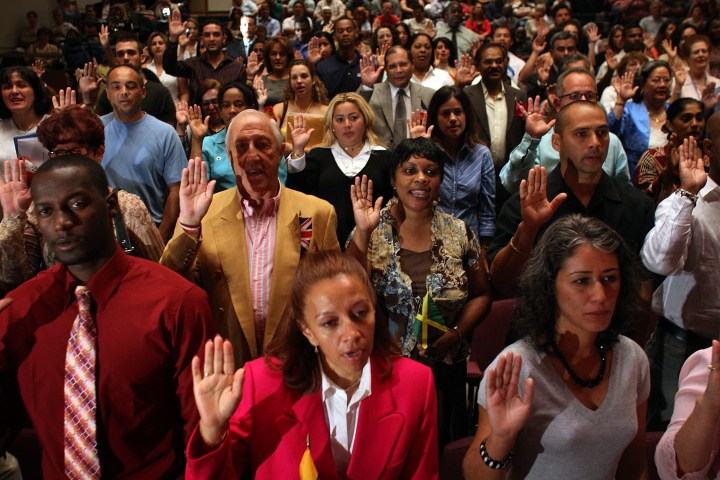
How increased citizenship fees could make life harder for immigrants and their communities
Share Now on:
How increased citizenship fees could make life harder for immigrants and their communities

As a little girl in West Africa, Mariam Kone loved her father’s stories from the United States. He lived there while she lived in their native Ivory Coast with her two siblings. In 2012, with hopes of securing a better education and job prospects, she made the move herself.
Kone, now 25, lives in Harlem with her family and studies business and marketing at Borough of Manhattan Community College. She has dreams: She wants to build a retail business in the city. But money’s tight. Kone works at a beauty supply store and makes $250 a week. She pays for school and other expenses on her own. When she applies for better-paying jobs, one question keeps cropping up that makes her nervous.
“They ask me if I’m a citizen.”
If the Trump administration’s proposed citizenship application fee hike goes into effect, securing citizenship might become a lot harder.
Six hundred and forty dollars, plus an additional $85 for fingerprints, photo and other biometric data. That’s how much it costs to file an application for U.S. citizenship right now. But a proposed 61% hike by the U.S. Citizenship and Immigration Service could put that figure closer to $1,170.
USCIS also proposed removing the means-tested benefit criteria that waives certain citizenship-related fees. A California federal court injunction on the waiver proposal has stalled that proposal for now.
Why the proposed increase in fees?
The higher fees are to cover operational costs and to help recover “the full cost of administering the nation’s immigration laws,” according to a USCIS statement.
According to USCIS, the $725 immigrants pay to file for citizenship does not cover the true cost of the application process or the related services around it. Hiking the fee, “minimizes subsidies from an already over-extended system,” in the words of Ken Cuccinelli, acting director of USCIS.
In July 2019, USCIS representatives testified in a congressional hearing about tackling its large number of backlogs. A 2019 report from the American Immigration Lawyers Association confirmed that the average case processing time rose by 46% between 2016 and 2018 and by 94% since 2014.
USCIS processes many different kinds of applications and petitions for immigration services and benefits, such as marriage-based green card applications. USCIS had a $4.5 billion budget in fiscal year 2018. And nearly 97% of that budget comes from fees, even though it is a government agency.
Immigration experts say there’s more to the story than operational cost.
Who could be affected?
Elora Mukherjee, director of Columbia University’s Immigrants’ Rights Clinic, said that any increase to the application fee would be a targeted, strategic move.
“It is one of a myriad number of efforts that seek to make immigration benefits in the United States dependent on a person’s access to wealth,” she said.
Mukherjee said that these fee hikes will hit lower-income working residents the hardest.
“The [proposed] new fee amount is equivalent to a week’s pay or more than a week’s pay for many households of those who are eligible to naturalize. It’s a lot of money,” she said. “It would impose a severe hardship on many families who are seeking to naturalize.”
It would impact people like Mariam Kone in Harlem, and she worries about that. “It’s going to affect me because you have to put money together and work hard to have that money to pay. You’re not going to go, like, ‘Oh, here’s the money!’ right away. No, it’s not like that,” Kone said.
Kone said that as it is, things are hard. If the fees go up, a lot about her personal finances will have to change. “As I said, I make $250 a week. Imagine in a month how much I’m getting? It’s not enough. It’s going to [have to] change.”
Economic rationale
Other immigration experts said limiting the number of new citizens doesn’t make sense for the U.S. economy
“This would be as if a job applicant was like, ‘I really want to work at your company,’ and would be able to add so much value, and instead I make them jump through significantly more hoops to the point where they might decide that it’s not worth it,” said Xiao Wang, the co-founder and CEO of Boundless, an immigration services platform.
People who are in immigration status limbo are less likely to go for higher-paying jobs and invest financially in their communities compared to citizens, said Wang. It also impacts personal wealth, which can have a ripple effect on local economies. “Becoming a naturalized citizen by itself can boost individual earnings by between 8% and 11%,” Wang said. Data from the Census Bureau also suggests that citizenship has a positive effect on homeownership rates.
Besides just the economy, Sarah Sherman-Stokes, Associate Director of Boston University’s Immigrants’ Rights and Human Trafficking Clinic, says the proposed fee hike is also connected to the politics of the Trump administration.
“I think this proposal is a transparent attempt to curtail the number of immigrants who will become citizens in [time for] the next election.”
Under the Trump administration’s proposed USCIS changes, fees for other applications –– such as marriage-based green cards, suspension of deportation, among others –– would also increase.
There’s a lot happening in the world. Through it all, Marketplace is here for you.
You rely on Marketplace to break down the world’s events and tell you how it affects you in a fact-based, approachable way. We rely on your financial support to keep making that possible.
Your donation today powers the independent journalism that you rely on. For just $5/month, you can help sustain Marketplace so we can keep reporting on the things that matter to you.


















